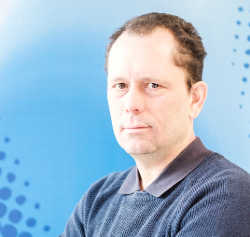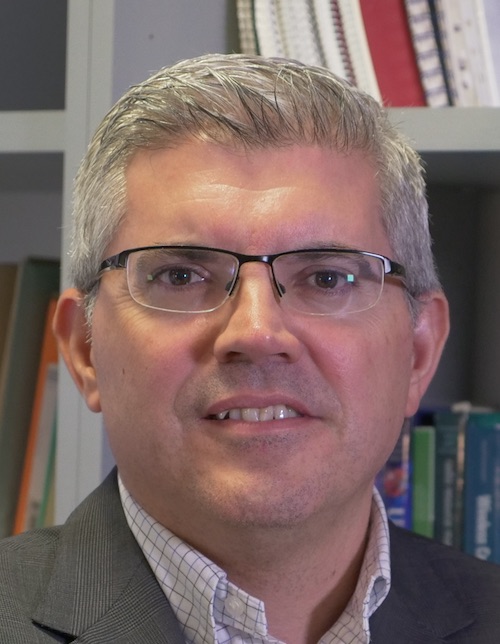LCN Keynote Presentations
Making Our Networking Stack Truly Extensible
Dr. Olivier Bonaventure
Head of the GroupDepartment of Computing Science and Engineering
IP Networking Lab
Louvain-la-Neuve, Belgium
ABSTRACT
BPF is a simple virtual machine that was designed to facilitate packet filtering. It was later extended and attached to the Linux kernel where it provides a growing number of useful services. This talk explores how eBPF enables our ossified networking stack to become truly extensible.
The talk starts with a brief description of how eBPF makes IPv6 Segment Routing truly programmable. Then, I explain how with proper eBPF support in the TCP stack, it becomes possible to support new TCP options or modify TCP algorithms using eBPF code that is injected by applications.
I then describe how eBPF can make Multipath TCP much more flexible than it is today. Similar techniques are also applicable for higher layer protocols. I then explain how we added eBPF support to QUIC and used this new extensibility technique to create pluginised QUIC, a variant of QUIC where a server can send over a QUIC connection eBPF bytecode that adds support for new extensions on the client. We used this technique to implement Multipath QUIC, QUIC VPN and add support for Forward Erasure Correction to demonstrate its flexibility. A similar technique has been applied to ToR, BGP and OSPS. The talk ends with a discussion of the architectural impacts of this new approach.
ABOUT THE SPEAKER
 |
Olivier Bonaventure is professor at UCLouvain (Belgium) where he leads the IP Networking Lab. Together with the Ph.D. students and postdocs of the lab, he has contributed to various networking protocols including BGP, LISP, Multipath TCP, IPv6 Segment Routing, and QUIC. He is active within the IETF and the lab has produced open-source implementations of important protocols including Multipath TCP, IPv6 Segment Routing, LISP, and more. He is the current editor in chief of SIGCOMM CCR and the main author of the open-source Computer Networking: Principles, Protocols and Practice e-book. He co-founded the Tessares company that pioneers the deployment of Hybrid Access Networks. |
Tactile Internet with Human-In-The-Loop
Dr. Frank H. P. Fitzek
Professor and Head of the "Deutsche Telekom Chair of Communication Networks"Technische Universität Dresden
Dresden, Germany
ABSTRACT
The talk will address the technology needed to build up the tactile Internet. Main focus is on low latency and ultra-reliable communication and how it can be realized in softwarized networks. Current technologies such as 5G are discussed to enable the tactile Internet. Furthermore, the talk will highlight inter disciplinary research on tactile Internet with focus on phycology and medicine building the required human to machine interfaces to have mutual learning between humans and machines.
ABOUT THE SPEAKER
 |
Frank H. P. Fitzek is a Professor and head of the "Deutsche Telekom Chair of Communication Networks" at TU Dresden coordinating the 5G Lab Germany. He is the spokesman of the DFG Cluster of Excellence CeTI. He received his diploma (Dipl.-Ing.) degree in electrical engineering from the University of Technology – Rheinisch-Westfälische Technische Hochschule (RWTH) – Aachen, Germany, in 1997 and his Ph.D. (Dr.-Ing.) in Electrical Engineering from the Technical University Berlin, Germany in 2002 and became Adjunct Professor at the University of Ferrara, Italy in the same year. In 2003 he joined Aalborg University as Associate Professor and later became Professor. He co-founded several start-up companies starting with acticom GmbH in Berlin in 1999. He has visited various research institutes including Massachusetts Institute of Technology (MIT), VTT, and Arizona State University. In 2005 he won the YRP award for the work on MIMO MDC and received the Young Elite Researcher Award of Denmark. He was selected to receive the NOKIA Champion Award several times in a row from 2007 to 2011. In 2008 he was awarded the Nokia Achievement Award for his work on cooperative networks. In 2011 he received the SAPERE AUDE research grant from the Danish government and in 2012 he received the Vodafone Innovation prize. In 2015 he was awarded the honorary degree "Doctor Honoris Causa" from Budapest University of Technology and Economy (BUTE). His current research interests are in the areas of wireless and 5G communication networks, network coding, cloud computing, compressed sensing, cross layer as well as energy efficient protocol design and cooperative networking. |
V2X Networks for Connected and Automated Driving
Dr. Javier Manuel Gozalvez Sempere
Professor and Director, Ubiquituous Wireless Communications Research (UWICORE) LaboratoryCommunications Engineering Department
Universidad Miguel Hernández de Elche (UMH)
Elche, Spain
ABSTRACT
V2X (Vehicle-to-Everything) networks will be fundamental for the reliable, scalable and successful deployment and operation of Connected and Automated Vehicles (CAVs). This talk will first discuss why V2X networks are necessary for CAVs, and how they can support advanced cooperative driving (or maneuvering) and perception applications. This includes an overview of current standardization activities, and insights into challenges of cooperative driving and perception. There is currently a lively technical and industrial debate on which V2X technology (IEEE 802.11- or cellular-based) is better suited to support CAVs. The second part of the talk will then analyze the current V2X technologies, their performance, challenges and opportunities, as well as their evolution. The talk will end with a discussion on the need to envision a future heterogeneous V2X ecosystem to effectively support a reliable and scalable deployment of CAVs.
ABOUT THE SPEAKER
 |
Javier Gozalvez received an electronics engineering degree from the Engineering School ENSEIRB (Bordeaux, France), and a PhD in mobile communications from the University of Strathclyde, Glasgow, U.K. Since October 2002, he is with the Universidad Miguel Hernández de Elche (UMH), Spain, where he is currently a Full Professor and Director of the UWICORE laboratory. At UWICORE, he leads research activities in the areas of vehicular networks, 5G and beyond networks, and industrial wireless networks. He is an elected member to the Board of Governors of the IEEE Vehicular Technology Society (VTS) since 2011, and served as President of the IEEE VTS in 2016 and 2017. He was an IEEE Distinguished Lecturer for the IEEE VTS, and currently serves as IEEE Distinguished Speaker. He is the Editor in Chief of the IEEE Vehicular Technology Magazine. He is the Founder and General Co-Chair of the IEEE Connected and Automated Vehicles Symposium 2019 and 2018. He has previously acted as General co-chair or TPC co-chair for conferences like IEEE VTC, ACM VANET, or IEEE ISWCS. |
